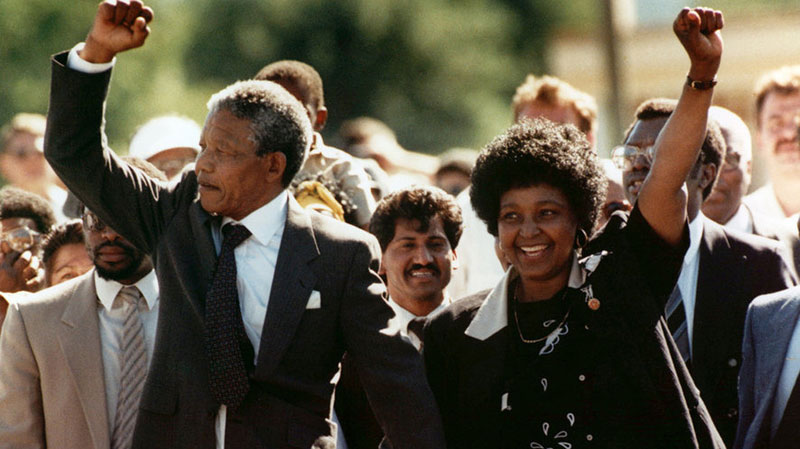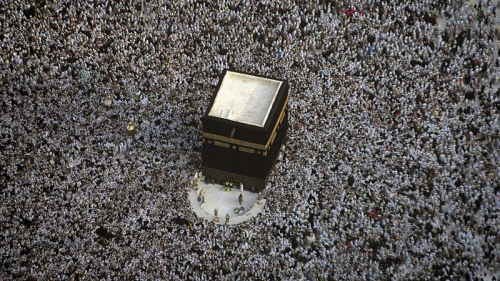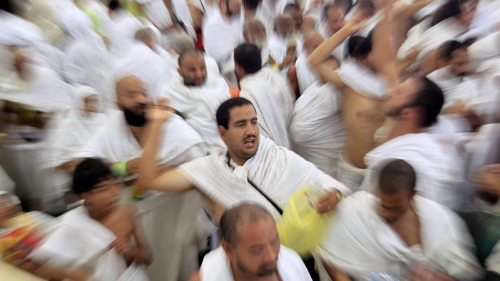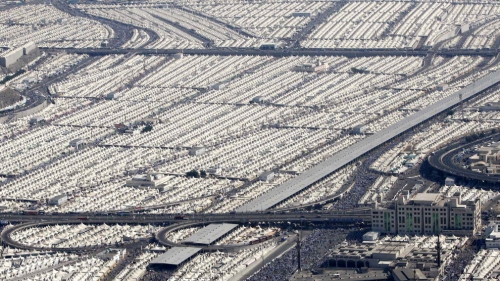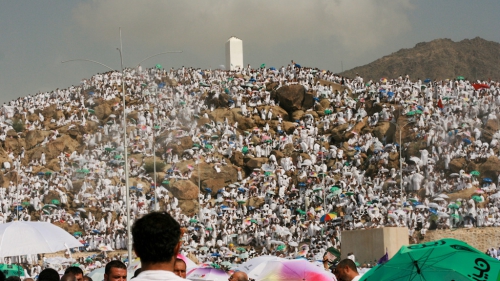Freedom

The following is an excerpt from the autobiography of Nelson Mandela A Long Walk to Freedom. Mandela died December 5th, 2013.
|
|
One of the first questions to be resolved was where I would spend my first night of freedom. My inclination was to spend the night in the Cape Flats, the bustling black and Coloured townships of Cape Town, in order to show my solidarity with the people. But my colleagues and, later, my wife argued that for security reasons I should stay with Archbishop Desmond Tutu in Bishop's Court, a plush residence in a white suburb. It was not an area where I would have been permitted to live before I went to prison, and I thought it would send the wrong signal to spend my first night of freedom in a posh white area. But the members of the committee explained that Bishop's Court had become multiracial under Tutu's tenure, and symbolized an open, generous nonracialism.
The prison service supplied me with boxes and crates for packing. During my first twenty or so years in prison, I accumulated very few possessions, but in the last few years I had amassed enough property- mainly books and papers to make up for previous decades. I filled over a dozen crates and boxes.
My actual release time was set for 3 P.M., but Winnie and Walter and the other passengers from the chartered flight from Johannesburg did not arrive until after two. There were already dozens of people at the house, and the entire scene took on the aspect of a celebration. Warrant Officer Swart prepared a final meal for all of us, and I thanked him not only for the food he had provided for the last two years but the companionship. Warrant Officer James Gregory was also there at the house, and I embraced him warmly. In the years that he had looked after me from Pollsmoor through Victor Verster, we had never discussed politics, but our bond was an unspoken one and I would miss his soothing presence. Men like Swart, Gregory, and Warrant Officer Brand reinforced my belief in the essential humanity even of those who had kept me behind bars for the previous twenty-seven and a half years.
There was little time for lengthy farewells. The plan was that Winnie and I would be driven in a car to the front gate of the prison. I had told the authorities that I wanted to be able to say good-bye to the guards and warders who had looked after me and I asked that they and their families wait for me at the front gate, where I would be able to thank them individually.
At a few minutes after three, I was telephoned by a well-known SABC presenter who requested that I get out of the car a few hundred feet before the gate so that they could film me walking toward freedom. This seemed reasonable, and I agreed to do it. This was my first inkling that things might not go as calmly as I had imagined.
By 3:30, I began to get restless, as we were already behind schedule. I told the members of the reception committee that my people had been waiting for me for twenty-seven years and I did not want to keep them waiting any longer. Shortly before four, we left in a small motorcade from the cottage. About a quarter of a mile in front of the gate, the car slowed to a stop and Winnie and I got out and began to walk toward the prison gate.
At first, I could not really make out what was going on in front of us, but when I was within one hundred fifty feet or so, I saw a tremendous commotion and a great crowd of people: hundreds of photographers and television cameras and news people as well as several thousand well-wishers. I was astounded and a little bit alarmed. I had truly not expected such a scene; at most, I had imagined that there would be several dozen people, mainly the warders and their families. But this proved to be only the beginning; I realized we had not thoroughly prepared for all that was about to happen.
Within twenty feet or so of the gate, the cameras started clicking, a noise that sounded like some great herd of metallic beasts. Reporters started shouting questions; television crews began crowding in; ANC supporters were yelling and cheering. It was a happy, if slightly disorienting chaos. When a television crew thrust a long, dark, furry object at me, I recoiled slightly, wondering if it were some newfangled weapon developed while I was in prison. Winnie informed me that it was a microphone.
When I was among the crowd I raised my right fist and there was a roar. I had not been able to do that for twenty-seven years and it gave me a surge of strength and joy. We stayed among the crowd for only a few minutes before jumping back into the car for the drive to Cape Town. Although I was pleased to have such a reception, I was greatly vexed by the fact that I did not have a chance to say good-bye to the prison staff. As I finally walked through those gates to enter a car on the other side, I felt even at the age of seventy-one that my life was beginning anew. My ten thousand days of imprisonment were over.
On the evening of May 2, Mr. de Klerk made a gracious concession speech. After more than three centuries of rule, the white minority was conceding defeat and turning over power to the black majority. That evening, the ANC was planning a victory celebration at the ballroom of the Carlton Hotel in downtown Johannesburg. I was suffering from a bad case of the flu and my doctors ordered me to remain at home. But there was nothing that could keep me away from that party. I went onstage at about nine o'clock and faced a crowd of happy, smiling, cheering faces.
I explained to the crowd that my voice was hoarse from a cold and that my physician had advised me not to attend. "I hope that you will not disclose to him that I have violated his instructions," I told them. I congratulated Mr. de Klerk for his strong showing. I thanked all those in the ANC and the democratic movement who had worked so hard for so long. Mrs. Coretta Scott King, the wife of the great freedom fighter Martin Luther King Jr., was on the podium that night, and I looked over to her as I made reference to her husband's immortal words.
"This is one of the most important moments in the life of our country. I stand here before you filled with deep pride and joy-pride in the ordinary, humble people of this country. You have shown such a calm, patient determination to reclaim this country as your own, and now the joy that we can loudly proclaim from the rooftops-Free at last! Free at last! I stand before you humbled by your courage, with a heart full of love for all of you. I regard it as the highest honor to lead the ANC at this moment in our history. I am your servant....It is not the individuals that matter, but the collective...This is a time to heal the old wounds and build a new South Africa."
It was during those long and lonely years that my hunger for the freedom of my own people became a hunger for the freedom of all people, white and black. I knew as well as I knew anything that the oppressor must be liberated just as surely as the oppressed. A man who takes away another man's freedom is a prisoner of hatred, he is locked behind the bars of prejudice and narrow-mindedness. I am not truly free if I am taking away someone else's freedom, just as surely as I am not free when my freedom is taken from me. The oppressed and the oppressor alike are robbed of their humanity.
When I walked out of prison, that was my mission, to liberate the oppressed and the oppressor both. Some say that has now been achieved. But I know that that is not the case. The truth is that we are not yet free; we have merely achieved the freedom to be free, the right not to be oppressed. We have not taken the final step of our journey, but the first step on a longer and even more difficult road. For to be free is not merely to cast off one's chains, but to live in a way that respects and enhances the freedom of others. The true test of our devotion to freedom is just beginning.
I have walked that long road to freedom. I have tried not to falter; I have made missteps along the way. But I have discovered the secret that after climbing a great hill, one only finds that there are many more hills to climb. I have taken a moment here to rest, to steal a view of the glorious vista that surrounds me, to look back on the distance I have come. But I can rest
For more information about Nelson Mandela, go to the Nelson Mandela Foundation
Source: Muslim Presence
Related Suggestions
the oppressed, truthfulness,forgiveness.The same principle Islam
stands for which unfortunately many people don't understand due
media manipulation and misconception. All over the world many
Muslims are struggling and fighting for justice and fairness which
unfortunately many people especially the politicians and the leaders
and intellectuals try to cover the truth by closing their eyes due
to media propaganda thus maintaining the status quo which is very
sad.Apart from few most of these struggles are genuine struggle for
the right of the masses continued despite the persecution right from
the people who love freedom people persecuted in Guantanamo Bay in
Cuba to the longest continuous struggle the Palestinian struggle is
more than half century which is 60 years to Kashmir down to
Mindanao in Philpinnes or the ,Rohingha in Burma the rights of the
Muslims in China known as Ughuir all have been forgotten and many
more other nations whose human rights are being denied and
unfortunately persecuted without mincing a word telling us don't
talk about it.Shut up. We continue mentioning so many up to the Arab
spring which brought awareness and democracy which attracted the
media to show interest spreading to many Arab countries including
Egypt and Libya which brought the end of their repressive regimes
there.He was genius who helped brought down the Aparthied system to
its knees which unfortunately is being practiced indirectly or
directly against Muslims in those Countries mentioned.He was symbol
of continuous struggle till victory a man of humility like late Ugo
Chavez of Venezuela who identified himself with the poorthe reason
which why still he had respect among Venezuelans so similarly
Mandela all over the World and interesting character who would be
remembered by so many.






